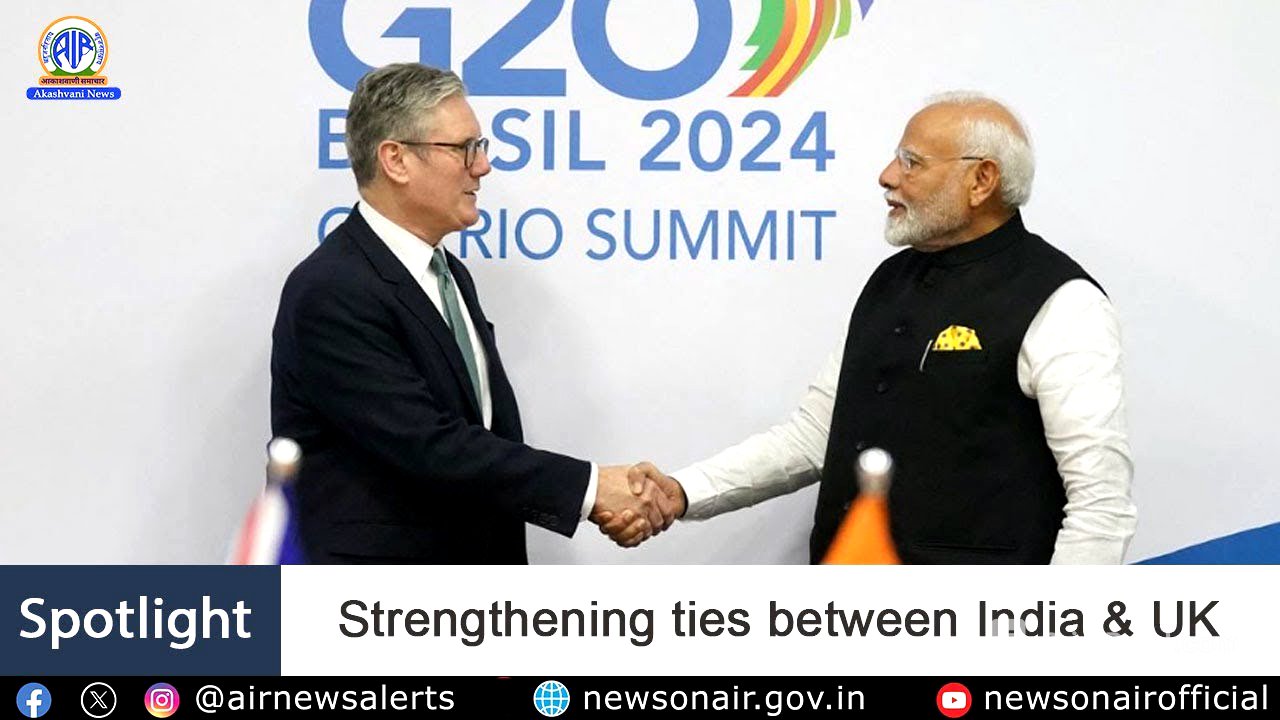TLDR;
This discussion focuses on the strengthening ties between India and the UK, highlighting Prime Minister Modi's visit to the UK and its potential impact on bilateral relations. Key points include:
- The historical and evolving relationship between India and the UK, especially post-Brexit.
- The significance of the Free Trade Agreement (FTA) and its potential benefits for both economies.
- The comprehensive nature of the partnership, spanning trade, investment, technology, defence, and people-to-people connections.
Introduction [0:03]
The program "Spotlight" on Akashwani discusses the strengthening ties between India and the UK, focusing on Prime Minister Narendra Modi's official visit. The discussion includes Professor Gulchan Sachdeva, an international affairs expert, and Sonu Sud, the anchor. The conversation aims to explore the potential for deepening bilateral relations between the two countries during this visit.
Prime Minister's Visit and Bilateral Ties [0:11]
Prime Minister Modi's four-day visit to the UK and Maldives is highlighted, with a focus on his discussions with UK Prime Minister K Starmmer and King Charles III. The aim is to enhance the economic partnership, fostering prosperity, growth, and job creation in both countries. Foreign Secretary Vikram Misri notes that the visit provides an opportunity to review the bilateral relationship, strengthen it further, and discuss regional and global issues. The India-UK partnership, upgraded to a comprehensive strategic partnership in 2021, has seen regular high-level political exchanges, with both sides committed to further enhancement.
Historical Context and Current Relations [2:03]
Professor Sachdeva provides an overview of the historical ties between India and the UK, acknowledging both positive and negative legacies, including colonialism, partition, and the Cold War. Despite these, there are strong institutional and people-to-people linkages. Relations have strengthened since the 1990s, leading to a strategic partnership in 2004 and an enhanced partnership in 2010. Brexit has further strengthened these relations, with the UK seeking new global linkages and viewing India as a crucial partner, especially with the UK's tilt towards the Indo-Pacific region since 2021.
Free Trade Agreement (FTA) and Trade Policies [3:57]
The main highlight of the strengthened relationship is the potential signing of a Free Trade Agreement (FTA) between India and the UK. Negotiations began in 2022, building on earlier discussions dating back to 2007 when the UK was part of the European Union. While India-EU negotiations are ongoing, the India-UK negotiations were finalised in May of this year. Both Prime Ministers have hailed the agreement as a landmark deal, with the UK viewing it as their biggest trade deal since Brexit. The UK has also signed agreements with Australia and New Zealand and joined the CPTPPP. India, with its growing economy and exports, has also become more confident in signing trade agreements, including those with Australia, the UAE, and Mauritius, with advanced negotiations with the EU and the United States.
Impact and Benefits of the FTA [6:18]
India's High Commissioner to the UK, Vikram Duray Swami, discusses the ongoing efforts to finalise the Free Trade Agreement, emphasising its detailed and ambitious nature. The FTA is expected to drive growth in both economies by providing businesses with a more predictable framework for trade. It includes tariff reductions, improved terms of trade, customs arrangements, rules of origin, government procurement, and covers significant areas in services.
Comprehensive Partnership and Future Collaboration [7:29]
The collaboration between India and the UK spans various sectors, including trade, investment, technology, innovation, security, and defence. The comprehensive agreement covers trade in goods and services, intellectual property rights, government procurement, labour, telecom, and digital areas. The 2030 road map includes renewable energy, defence, and security, with initiatives like the technology security initiative covering artificial intelligence, critical minerals, quantum telecom, and biotechnology. Educational and people-to-people linkages are also strengthened. A separate investment agreement is under negotiation to further boost investment.
Defence and Security Cooperation [9:20]
The FTA is expected to strengthen the defence partnership, with India undertaking a significant defence modernisation program and becoming a defence exporter. The UK has advantages in certain areas, fostering trust and institutional building. Financial and technical collaborations between Indian and British companies will also strengthen the defence relationship, potentially leading to India becoming a major defence producer.
Diaspora and Mobility [10:07]
The Prime Minister's visit is expected to boost the Indian diaspora in the UK, which numbers over 1.8 million, including 170,000 students. Agreements on migration, mobility, and young professionals facilitate greater mobility. A double contribution convention agreement will ease short-term mobility for professionals in sectors like IT, reducing costs for companies.
Trade Benefits and Tariff Reductions [11:47]
The trade agreement will result in approximately 99% of Indian products entering the UK market tariff-free, benefiting sectors like textiles, gems and jewellery, marine products, engineering, and organic chemicals. While it's a give-and-take situation, the UK seeks to expand its market for Scotch whisky in India, with tariffs reducing from 150% to 75% and eventually 40% over 10 years. Most Indian products will have immediate access, while British products will see phased tariff elimination, with over 60% having immediate access. Certain sectors, like automobiles, will have limited quotas.
Maturity of Indian Economy and Industry [13:18]
The agreement demonstrates the maturity of the Indian economy and industry, enabling them to compete globally. It addresses the competition faced by Indian products like textiles from other countries with existing trade agreements. This agreement will significantly benefit many Indian industries.
Conclusion [13:51]
Professor Sachdeva is thanked for providing insights into the significance of the Prime Minister's visit to the UK and its potential to deepen bilateral relations between India and the UK across diverse areas. The discussion concludes, highlighting the various platforms where the program can be accessed and encouraging feedback from listeners.









